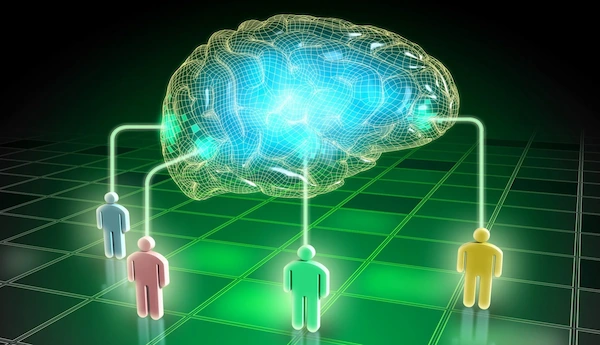1. What is the Spiritual Awakening Test?
The Spiritual Awakening Test is a unique psychological and spiritual assessment designed to measure your current position along the path toward the evolution of consciousness. Unlike typical personality tests that focus on behavioral traits, this instrument evaluates specific areas of behavior and consciousness related to the process of a soul awakening.
Soul Awakening represents the profound evolution of consciousness where the spiritual essence of our being begins to transcend the limitations of material existence. This transformation occurs at the intersection of psyche and spirit—a phenomenological shift in which our deeper, eternal nature emerges from beneath the conditioned patterns of ordinary awareness.
The test serves as a lighter, but no less accurate, version of the Spiritual Awareness Test, recommended primarily for those people who are only now beginning to explore the realm of spirituality.
2. How does the Spiritual Awakening Test work?
The Spiritual Awakening Test is structured as a comprehensive introspective assessment:
- Format: It consists of 27 questions with 5 types of responses corresponding to different stages of Awakening.
- Scoring System: The test uses a detailed scoring system with responses ranging from 0 to 5 points, allowing for precise assessment of your awakening level.
- Time Commitment: Completing the questionnaire takes at least 20 minutes and demands concentration.
- Results Range: The test provides scores that correspond to different awakening stages, from “Deep Sleep” to “Advanced Awakening”.
3. What are the Four Spheres of Interest?
The Spiritual Awakening Test evaluates your advancement in four specific areas of consciousness:
Detachment
The ability to psychologically detach oneself from everything that is worldly: objects, money, work, affections. Yes, even interpersonal relationships are part of this sphere: the soul seeks the absolute, while most earthly relationships based on kinship and mutual need are entirely transitory.
Disillusionment
After an initial phase of upset, denial and anger, comes disillusionment. The ego resists and does not want to give up its illusions and false certainties; while the soul, which observes things from an unearthly perspective, begins little by little to demolish everything that is no longer needed.
Inconvenience
A comfortable and leisurely life does not promote spiritual evolution and is ill-suited to the awakening process. Like it or not, suffering is a potential spiritual catalyst, and knowing how to distance oneself from the many conveniences of this consumerist world is a crucial first step toward a renewed vision of existence.
Symptomatology
The process of soul awakening reveals itself through a complex series of symptoms and phenomena that are not always easy to grasp. We tried to collect the most common and typical ones from the early and middle stages of the awakening journey.
4. Who should take the Spiritual Awakening Test?
This test is designed for individuals beginning their spiritual journey:
- It is recommended primarily for those people who are only now beginning to explore the realm of spirituality.
- The test setting may require a certain degree of maturity and inclination toward introspection. It is possible that a teenager under the age of 16 may not fully comprehend certain nuances inherent in the questions and answers.
- For younger individuals who wish to take these tests, it may be advisable to do so in the company of an adult, in order to receive guidance and support.
- An adult person who is accustomed to functioning on an unconscious level in daily life, and who has little desire to delve deeply into matters, would likely find these tests to be intimidating and uninteresting.
5. What will I receive after completing the test?
Upon completion, you will receive a comprehensive results package including:
- Detailed Score Analysis: Your position on the awakening spectrum from “Deep Sleep” to “Advanced Awakening”.
- Personality Profile: Specific personality traits, charts, and insights based on your responses.
- Four Spheres Assessment: Individual scores for Detachment, Disillusionment, Inconvenience, and Symptomatology.
- Certificate: A certificate of awakening along with an email outlining your result.
- Educational Content: An in-depth article on the topic of spiritual awakening written especially for users.
6. How should I approach the test to get an authentic result?
To ensure the most accurate and insightful outcome:
Be Concentrated and Patient
The awakening and awareness tests should be taken with utmost concentration, striving to understand the meaning of each answer, though seemingly trivial, before making one’s choices. It is important to note that providing hasty or spontaneous answers tends to result in lower to medium scores.
Be Sincere and Authentic
A common problem with all personality tests is that which lies in the difference between answers perceived as genuine and those perceived as socially desirable. The most insecure individuals show a certain predisposition toward answers that are considered “right”, but not necessarily perceived as authentic.
Have Adequate Time
Our recommendation is to return when you have an hour of uninterrupted time, free from obligations, responsibilities, and any other factors that might influence your responses.
7. What do the different awakening levels mean?
The test results are categorized into distinct awakening stages:
Deep Sleep (Lowest Scores)
Personality Traits: Numbness, Conformism, Lightness.
Unfortunately your answers do not leave much room for interpretation; in fact, it seems that you are dreaming deeply, completely unaware of what is happening around you, probably by choice. When you are faced with complex situations and problems, you prefer to give yourself simple answers, to take the seemingly less intricate path, because everyone does it.
Light Sleep
Personality Traits: Convenience, Hustle, Adaptation.
Your psychological profile indicates the simultaneous presence of conflicting energies. It seems to be present in you a desire for awakening, or at least a weak drive toward a deeper and more realistic understanding of the world; but at the same time we detect an opposite need, a tendency to seek comfort and security in the dominant positions.
Drowsiness
Personality Traits: Perception, Insecurity, Moderation.
The stage of drowsiness is definitely peculiar: there is a need to rest on one hand and the necessity to stay alert on the other hand. Your answers hint at a principle of doubtfulness, a mental itch, so to speak, sometimes even a desire to delve into certain phenomena in the hope of discovering something unseen.
Tormented Drowsiness
Personality Traits: Sensitivity, Uncertainty, Discomfort.
Your answers suggest a certain emotional unease, resulting perhaps from a higher than average level of sensitivity, which feeds a strong sense of uncertainty connected to the need to seek a more authentic meaning in things.
Awakening in Progress
Personality Traits: Skepticism, Depth, Persistence.
Your score reveals a personality in the midst of research and discovery, much like that of the movie’s protagonist when he realizes that for a lifetime he has believed true what was fiction. You have given interesting answers, typical of those who are not easily misled and who can distinguish the true from the false.
Advanced Awakening (Highest Scores)
Personality Traits: Insight, Disenchantment, Integrity.
Yours is quite a high score and not within everyone’s reach, in fact only about 6% of our users reach the last step of our Awakening Test. You are a psychologically evolved person with strong insight as well as strongly disillusioned. The illusions of the world do not have much of a hold on you.
8. Is there a free version available?
Yes, for those who wish to try the test before purchasing, there is a free DEMO version available: Awakening Test Demo.
9. What is the difference between the Spiritual Awakening Test and the Spiritual Awareness Test?
The Spiritual Awakening Test and the Spiritual Awareness Test are two distinct instruments that evaluate different facets of your spiritual journey:
The Spiritual Awakening Test:
- Is a lighter, but no less accurate, version of the awareness test.
- Recommended primarily for those people who are only now beginning to explore the realm of spirituality.
- Focuses on four specific spheres: Detachment, Disillusionment, Inconvenience, and Symptomatology.
- Contains 27 questions with 5 response levels.
- Takes approximately 20 minutes to complete.
The Spiritual Awareness Test:
- Measures your current, overall level of consciousness.
- Assesses how you perceive and interpret reality across a broader spectrum.
- Contains 33 questions with 7 response levels.
- Takes 25-30 minutes to complete.
- Provides a more comprehensive consciousness assessment.
10. What makes this test unique compared to other online tests?
Compared to other tests available online, which are often trivializing the complexity of the subject, our test is not intended to provide a definitive answer, but rather to give an accurate indication of the level of perception and open-mindedness of the person taking it.
Key distinguishing features include:
Depth and Sophistication
By open-mindedness we do not mean, as is often the case, a person’s degree of tolerance and passive acceptance, but his or her ability to intuit and process possible alternatives to the common and socially accepted view of things.
Educational Value
At the end of the test you will also be offered an in-depth article on the topic of spiritual awakening written especially for our users.
Authenticity Focus
The test actively discourages superficial responses and encourages genuine self-reflection rather than socially desirable answers.
User Testimonials
User feedback consistently highlights the test’s serious approach: “I have done other spiritual awakening quizzes, and this one is the most serious” and “I got into spirituality after discovering this app and trying this test”.
11. What are some example questions and their deeper meanings?
Death and Attachment
“Choose the statement that best describes your relationship with death” – Apprehension about mortality indicates profound attachment to terrestrial existence and a perspective focused predominantly on biological and material dimensions. The eternal and immortal soul harbors no fear of physical cessation.
Material Freedom vs. Spiritual Freedom
“The car is an instrument of freedom. Do you agree?” – The automobile represents one of history’s most coveted possessions. Symbolically, the automobile resembles a box or cage in which one voluntarily confines oneself, paradoxically experiencing satisfaction in this confinement. True freedom exists within us—in our immortal essence.
Perception of Others
“Some people appear dull, as if they were flesh robots; others have a divine spark in their eyes” – If this question strikes you as offensive, it suggests you aren’t genuinely experiencing spiritual awakening. This observation contains no negativity; it simply states an observable phenomenon. Ancient wisdom maintains that the eyes function as windows to the soul.
Dreams and Spiritual Development
“Have you ever dreamed of flying?” – This represents a characteristic manifestation of spiritual awakening. Flight carries profound symbolic significance, intimately connected with the concept of freedom. Dreaming of flying wherever one desires indicates strong spiritual presence and development.
12. What physical symptoms might accompany spiritual awakening?
Individuals undergoing spiritual awakening typically manifest highly specific symptomatology, including:
- Sudden buzzing in hearing.
- Hypersensitivity toward light, noises, and tactile sensations.
- Tingling and pressure on the head, back, or neck.
- Dreams more vivid than usual.
- Vibrations within the body.
- Sudden intuitions.
- Feeling of disconnection from the body.
- Hypersensitivity toward injustice and abuse.
- Need to find superior meaning.
- Nostalgia toward something undefined.
- Higher-than-normal mental clarity.
- Sensation that life is unreal.
Distinctive physical manifestations often accompany spiritual awakening, including tingling sensations and unusual pressure in various bodily regions, particularly the cranial area. Frequently, these somatic experiences coincide with intuitive insights.
13. How should I interpret my results?
General Guidelines
We assume that you have carefully read the questions and answers, made your choices in good faith, and that you are at least 16 years of age. If you are under 16, please be assured that a low score is not a cause for concern. It is perfectly normal.
Scoring Interpretation
The score serves to indicate the degree of advancement in a given field. These areas are not entirely separate, but rather, they are interrelated.
Progression Understanding
For individuals undergoing psychological and spiritual evolution, modifying one’s perspective and worldview throughout life represents a natural progression. Eventually, one recognizes that reality isn’t singular or fixed; rather, each person interprets it according to their current level of awareness and consciousness.
14. Who actually designed and developed this test?
The Spiritual Awakening Test was a joint effort by the whole team at The Spiritual Seek: Dr. Martin Landi, Dr. Samuel J. Thomson, Dr. Armando Giacoboni, Dr. Philip H. Meo, Dr. Thalia Garcia and Dr. Margaret Benson. Nevertheless, without the invaluable contribution of our developer and webmaster, Luke Garrison, none of our tests would actually be possible.
15. Can I retake the test?
Yes, retaking the test can be valuable, especially if you recognize that your initial responses may have been influenced by social desirability bias. Now that you’ve taken note of the issue, you might like to repeat our personality tests treasuring this new awareness, and you will see that the final result will be more interesting.
16. What should I expect during the awakening process?
The Journey Nature
The path towards awakening, if it is genuine and not merely a product of mental illusion, can only progress in one direction; retreating is no longer an option.
Transformation Stages
One such stage is disillusionment, which is subsequently followed by the reevaluation and repurposing of the numerous assumptions that were previously taken for granted. This shift occurs as a result of the individual’s newfound ability to perceive these concepts through the lens of consciousness.
Personal Responsibility
The Awakened One is an individual who has transcended the automatic pilot of the mind, thereby assuming control of their own existence.
Individual Nature
The journey of awakening is inherently personal and individualistic, not a collective endeavor. Spiritual evolution emerges from questioning, experiencing hardship, and confronting disillusionment.
17. What scientific theories or empirical evidence support the Spiritual Awakening Test?
This spiritual assessment draws on a comprehensive foundation of empirical research and scholarly work from multiple disciplines. Its theoretical framework is supported by extensive evidence from psychology, neuroscience, consciousness studies, and transpersonal research. The following academic sources provide scientific credibility and empirical grounding for the test’s approach to spiritual awakening and consciousness transformation.




